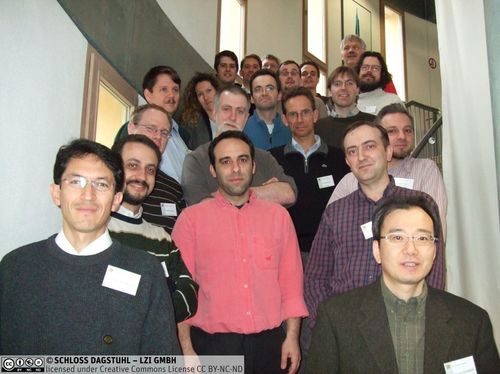Dagstuhl-Seminar 09072
Bandwidth on Demand
( 08. Feb – 11. Feb, 2009 )
Permalink
Organisatoren
- Panayotis Antoniadis (Université Paris VI, FR)
- David Hausheer (Universität Zürich, CH)
- Kohei Shiomoto (NTT Labs - Tokyo, JP)
- Burkhard Stiller (Universität Zürich, CH)
- Jean Walrand (University of California - Berkeley, US)
Kontakt
- Annette Beyer (für administrative Fragen)
The rapid technological progress in the area of network virtualization, mainly driven by new optical fiber technology and virtual router infrastructures, is generating a new trend for “on demand” provisioning of bandwidth or even whole networks for applications that require short-term bandwidth assignments at large scale, such as large sporting events or cultural open air activities. Network virtualization, in addition to numerous benefits that it offers in terms of security, flexibility, and reliability, enables the transparent sharing of physical network equipment between different customers of the same network provider. The current trend is backed by new optical network management systems which enable the provisioning of end-to-end light-paths across multiple independent optical network domains.
At the same time, the proliferation of wireless technology has enabled users “to be connected” anytime and anywhere in the world. What’s more, wireless devices allow users to offer network connectivity to each other, e.g. via mobile ad-hoc networks or neighborhood wireless mesh networks. The support of bandwidth allocation in a fully decentralized manner, such as based on emerging peer-to-peer (P2P) concepts, shows further advantages in terms of robustness and scalability for large-scale systems.
Despite (or due to) these recent technical advances, the provisioning of the right amount of bandwidth at the right location and at the right time remains a challenge. Suitable business models for “on demand” bandwidth services have not yet evolved. Moreover, the design of resource allocation policies and incentive mechanisms for cooperation in this context are very challenging and interesting research questions. Resource allocation mechanisms should aim, ideally, to maximize the overall social welfare of the system. However, participants may not have the incentive to disclose truthfully their private information. Auctions are a standard way to achieve such objectives, but the distributed environment and the different types of resources involved poses significant challenges on their design and implementation.
Wireless technology enables interesting new business models such as FON and Boingo. However, suitable incentive mechanisms are required for such systems to operate efficiently and avoid free riding and other types of undesirable behavior in terms of resource sharing and the overall distributed management of the system, which depends on the cooperation and resource contributions of all participants. These incentive issues reduce the overall value that could be generated thanks to the positive externalities that appear in P2P systems. It is of interest to study the potentials and limits of P2P bandwidth sharing systems and understand to what extent they could harm the ISP business. In addition, legislative and regulative issues related to these concepts have to be tackled.
Therefore, the purpose of this Dagstuhl Seminar on ``Bandwidth on Demand'' was to bring together researchers and practitioners from different disciplines to discuss and develop partially technical, economic, and regulatory mechanisms for the provisioning of bandwidth on demand services. The key topics tackled by this seminar included but were not limited to:
- The technical design of scalable, robust, and cost-effective bandwidth allocation and provisioning schemes, including fully decentralized and market-based mechanisms such as auctions
- Economic studies and modeling of market and business models in carrier and service provider networks, including cost and revenue models as well as game theoretical bandwidth on demand models
- Resource allocation and provision in non-profit systems such as neighborhood wireless mesh networks and network testbed infrastructures like GENI or PlanetLab
- Industrial developments of new technologies that facilitate or create impediments to bandwidth on demand, including network virtualization technologies and wireless mesh networks
- Legislative and regulatory issues related to the Telecom Act and in comparison to other commodities markets such as the electric grid, as well as legal issues of P2P trading infrastructures
In summary, the seminar was very successful. With 25 attendees it did lead to many fruitful discussions and scientific exchange. A future BoD workshop is planned to be organized again in colocation with a large conference.
- Athanassios Androutsos (Athens University of Economics and Business, GR)
- Panayotis Antoniadis (Université Paris VI, FR) [dblp]
- Fernando Beltran (Univ. of Auckland, NZ)
- Torsten Braun (Universität Bern, CH)
- Georg Carle (TU München, DE) [dblp]
- Zoran Despotovic (DOCOMO Euro-Labs - München, DE) [dblp]
- Jochen Dinger (KIT - Karlsruher Institut für Technologie, DE)
- Adrian Farrel (Old Dog Consulting - Llangollen, GB)
- Isabelle Hamchaoui (France Télécom R&D - Lanion, FR)
- Hannes Hartenstein (KIT - Karlsruher Institut für Technologie, DE) [dblp]
- David Hausheer (Universität Zürich, CH) [dblp]
- Christian Hoene (Universität Tübingen, DE)
- George Huitema (TNO - Groningen, NL)
- Aiko Pras (University of Twente, NL) [dblp]
- Peter Reichl (FZ Telekommunikation Wien, AT) [dblp]
- Giancarlo Ruffo (University of Turin, IT)
- Burkhard Stiller (Universität Zürich, CH) [dblp]
- Bruno Tuffin (INRIA - Rennes, FR) [dblp]
- Shigeo Urushidani (National Institute of Informatics - Tokyo, JP)
- Martin Waldburger (Universität Zürich, CH)
- Martina Zitterbart (KIT - Karlsruher Institut für Technologie, DE) [dblp]
Klassifikation
- networks
- business models
- mobile computing
Schlagworte
- bandwidth on demand
- bandwidth provisioning
- bandwidth trading
- network economics
- resource allocation
- network virtualization
- wireless mesh networks
- peer-to-peer networks
- business modeling
- telecommunications
- market mechanisms
- regulation
- legislation


